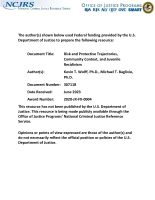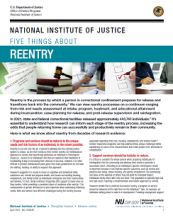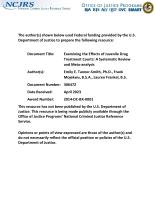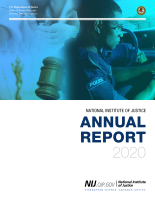Recidivism
Some Cognitive Transformations about the Dynamics of Desistance
Desistance from Crime during the Transition to Adulthood: The Influence of Parents, Peers, and Shifts in Identity
Enhancing Vocational Training in Corrections: A Type 1 Hybrid Randomized Controlled Trial Protocol for Evaluating Virtual Reality Job Interview Training Among Returning Citizens Preparing for Community Re-entry
Are All Welcome? An Empirical Examination of Visitor Networks Among Incarcerated Youth
Expert versus Youth Raters on Measuring Social and Therapeutic Climate in Secure Juvenile Placement
Expanding Mental Health Diversion Opportunities: A Prospective Evaluation of the Los Angeles County Intake Booking Diversion Program
Operationalizing the Individual versus Group Fairness Dichotomy for Recidivism Risk Assessment: US Legal Challenges and Technical Proposals
Mental Health in the Criminal Justice System-The Effect of Mandating Treatment for Convicted Individuals
THRIVE: Transformative Health and Reproductive Information for Incarcerated Women's Empowerment.
Thriving, Not Surviving: Refocusing Juvenile Justice Assessments and Strategies
Losing Sleep and Losing Control: The Impact of Subjective and Objective Sleep on the Problem Behavior and Mental Health of Justice-Involved Young Adults
The Extremism Sentencing Study: Judicial Outcomes and Recidivism Among Individuals Convicted of International and Domestic Terrorism
Inclusive Research: Engaging People Closest to the Issue Makes for Better Science & Greater Impact; 2023 NIJ Research Conference Plenary
This panel will discuss what inclusive research is, how to conduct it, and what issues and challenges exist about engaging in it. “Inclusive research” has its history as a participatory research method designed to ensure people closest to the issue or problem under study are authentically engaged in the research process rather than simply being “research subjects.” While community-based participatory research has begun to take on greater prominence in the criminal justice realm, such efforts are largely confined to qualitative research inquiries.
See the YouTube Terms of Service and Google Privacy Policy
Meeting People Where They Are to Improve Institutional Culture
Incarcerated individuals deserve opportunities for healing and growth, but they often lack the necessary resources for such opportunities. Additionally, organizational cultures that don’t support these outcomes often stand in the way. Researchers and practitioners gathered at NIJ’s 2023 National Research Conference to share ideas and projects that will increase opportunities for incarcerated populations around the country. This show continues their conversation.







